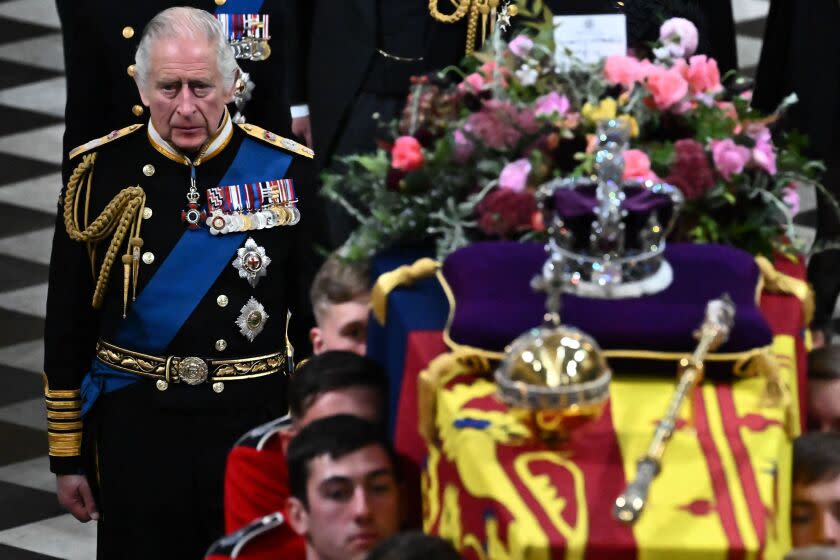Opinion: Having a king like Charles is a good defense for democracy

- Oops!Something went wrong.Please try again later.
As Britain’s King Charles III is officially coronated, the “empire on which the sun never set” is looking a little shabby. In addition to the United Kingdom, 14 former British colonies still maintain Charles as their monarch and head of state, but many of his subjects around the world are reconsidering the arrangement.
Barbados became a republic in 2021, and Jamaica has initiated a similar process of constitutional reform. Others might soon follow. Why should countries from Belize to Tuvalu maintain as their nominal head of state an old white man living in a middling power far away from them?
Americans, of course, find it difficult to understand why anyone would accept hereditary rulers, or why a purely ceremonial office has any value. But constitutional monarchy is alive and well in some of the world’s most developed countries. It should be jettisoned only after careful consideration of its significant benefits.
In constitutional monarchies, the head of government is either elected by the people or by their representatives in parliament. Heads of government in republics serve only for a limited term, whereas the monarch typically holds the job for life.
As defined, constitutional monarchy is not a rare phenomenon: There are currently 34, representing 18% of the roughly 193 independent countries. These are an extraordinarily successful set of countries by any standard, including most of Scandinavia, Japan, and Charles’ domains of Australia, Canada, and New Zealand.
According to the Economist Intelligence Unit Democracy Index 2022, 10 of the world’s top 20 democracies are constitutional monarchies, as are nine of the 20 richest countries. And eight of the 10 most enduring national constitutions provide for a monarch.
The surviving monarchies have done so mostly because, over a long period of time, they yielded power to legislative assemblies elected by the people. This process of political reform started with Magna Carta in England, and played out in the 19th century in most other countries.
When monarchs resisted encroachments on their power, they usually lost their thrones — and sometimes their heads. When they yielded, they became figureheads, but also signaled to conservatives that their interests were secure.
Monarchs also provide a form of political insurance, being able to step in during periods of national crisis. A famous example is King Juan Carlos I of Spain, who helped thwart a coup d’état launched in his name in 1981. He went on television and ordered the armed forces to return to their barracks, even as he was communicating individually with key generals, which helped prevent them from coordinating among themselves.
And monarchs can sometimes make subtle decisions that help political parties overcome deadlocks. In other crises, the monarch can act as a focal point for national resistance to invaders. During World War II, Norway’s King Haakon VII refused to recognize the government of the Nazi collaborator Vidkun Quisling, instead choosing to leave his country for the duration of the war.
In our era, the symbolic unity provided by monarchy can limit the most problematic forms of populism. Populist demagogues like Viktor Orbán in Hungary, Recep Tayyip Erdoğan in Turkey, and Jarosław Kaczyński in Poland typically claim an exclusive, almost mystical connection with the “people,” whom they alone can protect from the elites, and demonize their opponents as “enemies of the people.” Such claims, however, are ineffective under a constitutional monarchy. The job of embodying the people is already occupied, limiting how much symbolic power any other individual can accumulate.
So, while Erdoğan fashions himself as a new sultan, and Hugo Chávez, the late Venezuelan leader, liked to invoke president-for-life Simón Bolívar, it is difficult to see how a British, Danish, or Norwegian equivalent could credibly emerge. This is confirmed by data from the Global Populism Database showing that constitutional monarchies experience less populist rhetoric in political speeches.
To be sure, actually being a constitutional monarch is a job from hell. A constitutional monarch is in some sense a prisoner of society, playing only a ceremonial role, spending his or her days cutting ribbons and giving bland speeches, while having every move dissected for entertainment. No wonder some royals quit the family business: Along with Prince Harry, Princess Mako of Japan gave up her title in 2021, and Denmark’s Prince Joachim is the latest to decamp to the United States.
As Jamaicans and others consider whether to leave the Crown behind, they would do well to consider why constitutional monarchy has remained so successful in the 21st century. King Charles might appear to be the vestige of an archaic system, and no doubt his realm will shrink in the coming years. But it will not disappear, and for his remaining subjects that may be a very good thing.
Tom Ginsburg is a professor of international law and professor of political science at the University of Chicago.
This story originally appeared in Los Angeles Times.

